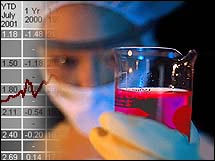|
Allos profit is two cancer drugs away But investing in biotech considered risky because of setbacks in breast cancer treatment. NEW YORK (CNNMoney.com) -- A small, Colorado-based biotech could be the next big winner in the booming cancer drug industry, especially with a recent boost from the FDA, but that depends on the outcome of its risky drug trials. Allos Therapeutics (up $0.10 to $3.90, Charts) is experimenting with two potential cancer drugs that could turn the biotech into a profitable company next year and more than double the company's stock price, analysts say.
But the late-stage test for one of these drugs, Efaproxyn, failed the first time, so investing in the company based on that drug's performance could be risky. Analysts are more bullish on Allos' other drug, PDX. Allos, based in the Denver-area suburb of Westminster, could finish testing Efaproxyn, its experimental treatment for breast cancer, by mid-2007. This drug, if successful, would ramp up the therapeutic effects of radiation therapy in women with such advanced forms of breast cancer that it has metastasized to the brain. Allos spokeswoman Jennifer Neiman said tests have shown that Efaproxyn could double the survival time to nine months in terminally ill patients. But another, late-stage study failed to produce good enough results to win the acceptance of the Food and Drug Administration. "The primary risk here for Efaproxyn is clinical risk," said Jason Kantor, analyst for RBC Capital Market. "They're running a very large Phase 3 [late-stage] program, and the last Phase 3 program that they ran missed its prime endpoint. We thought it was risky to predict success." Betting on Efaproxyn Rahul Jasuja, analyst for MDB Capital Group, also said Efaproxyn is a risky investment, but it could help drive future sales if tests are successful the second time around. Efaproxyn would encounter little, if any, competition, assuming it is approved by the FDA, said Jasuja. Jasuja projects the drug could reach $160 million in annual sales. While this might not seem like much to biotech giants such as Amgen (down $0.99 to $73.10, Charts) or Genentech (down $0.77 to $82.64, Charts), it would be a lot for Allos, which has no products on the market. If Efaproxyn is very successful in the late-stage trial, the drug might get pulled out of testing and put on the market earlier than expected. Neiman of Allos said a mid-term analysis of the Phase 3 testing is scheduled before year-end, and " a robust survival benefit" could result in "early termination of the trial." On the other hand, bad news from the mid-term analysis could cause a dip in the stock price, said Jasuja of MDB Capital Group. Efaproxyn is also in early-stage testing as a treatment for cervical cancer, as well as other forms of cancer, but the results of these tests are years away. Betting on PDX The investment risk from Efaproxyn is mitigated by another experimental Allos drug, PDX, which is in Phase 2 studies to shrink tumors in patients with T-cell lymphoma. "I am more excited about PDX than Efaproxyn," said Jasuja of MDB Capital Group, who projects $160 million in annual sales for PDX by 2012. "PDX has lower risk profile, though I am still counting on Efaproxyn." The FDA gave PDX a strong vote of confidence Oct. 3, when the agency granted "fast track" review status to the experimental drug. The FDA does this only with drugs that have shown promise in saving lives. If tests are successful, fast track status could get PDX on the market much sooner than initially expected. PDX is primarily why Jasuja of MDB Capital Group has set a price target of $7 per share for Allos, nearly double its current level of $3.80. Mark Monane, analyst for Needham & Co., projects that shares will reach $9 and recently upgraded his Allos rating to "strong buy," particularly because of PDX. Jason Kantor of RBC Capital Markets said he's "cautiously optimistic," with an Allos price target of $5. That's the level where Allos was trading a year ago, before it suffered a 22 percent decline. The uncertainty over Efaproxyn, and the balancing of its potential rewards with its tarnished history, makes investing in Allos "a high-risk, high-reward situation," said Kantor, who projects $200 million in annual sales for the drug, if approved. Betting on both However, if Efaproxyn fails, Allos might be spared the more cataclysmic stock disaster suffered by the Canadian biotech Vasogen (down $0.03 to $0.64, Charts) in June. Vasogen's lead pipeline drug Celacade failed its late-stage study for a second time, causing an 80 percent decline in stock price. Unlike Allos, Vasogen didn't have a stronger second product waiting in the wings. "PDX definitely looks like an interesting drug [and could] certainly provide a valuation backstop if Efaproxyn doesn't work," said Kantor. "This is important, because you've seen a lot of one-trick ponies where the drug blows up and they've got nothing to back it up." Monane of Needham said the late-stage presence of two, not just one, potential cancer drugs is why he's so bullish on Allos. "It's definitely a risky business, but I think [Allos] has done a very good job of decreasing those risks," said Monane. "It's nice to have a biotech company that has more than one shot on goal." Cancer is America's No. 2 killer, behind heart disease. The American Cancer Society expects 565,000 cancer-related U.S. deaths in 2006. Because cancer is rampant in the affluent and aging regions of North America and Europe, IMS Health projects the cancer drug market to double to $55 billion by 2009. The second-biggest biotech Genentech, the Swiss drug giant Novartis (down $0.65 to $57.09, Charts), and Pfizer (down $0.01 to $27.64, Charts), the biggest drugmaker in the world, are among the leading players in this category. The analysts interviewed for this story do not own shares of stock in companies mentioned here. |
|

